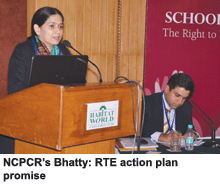The Delhi-based National Commission for Protection of Child Rights (NCPCR) — the independent constitutional authority for monitoring effective implementation of the Right to Free and Compulsory Education Act 2009 (aka RTE Act) which makes it mandatory for the State to provide free and compulsory education to all children between ages six-14 countrywide — will formally begin its monitoring function on January 1 for 18 states of the Indian Union, with the remaining 11 coming within its purview later. NCPCR has created a separate division to oversee implementation of the RTE Act, and a grievance cell to “inquire into complaints relating to child’s (sic) rights to free and compulsory education” as mandated under s.31(1)(a) of the Act, has also become operational.
 “The right to free and compulsory elementary educa-tion conferred upon India’s children by the RTE Act is a very important right and at the same time complex to implement. Delivering this right to more than 200 million children across the country, is a huge challenge, opportunity and responsibility imposed upon NCPCR. We intend to roll out a compre-hensive programme of action in the coming months,” says Kiran Bhatty, national coordinator (RTE) of NCPCR.
“The right to free and compulsory elementary educa-tion conferred upon India’s children by the RTE Act is a very important right and at the same time complex to implement. Delivering this right to more than 200 million children across the country, is a huge challenge, opportunity and responsibility imposed upon NCPCR. We intend to roll out a compre-hensive programme of action in the coming months,” says Kiran Bhatty, national coordinator (RTE) of NCPCR.
However implementation of the RTE Act which became law on April 1 countrywide (Jammu & Kashmir excepted) is moving at snails pace. Only five states — Manipur, Arunachal Pradesh, Sikkim, Uttarakhand and Orissa — have notified Rules under the Act besides the Union territories of Chandigarh and Andaman & Nicobar, which have wholly adopted the model Rules suggested under the Act. The other states have published draft Rules to give effect to the RTE Act, but most of them have attracted a barrage of criticism especially from managements of the country’s 294,862 private schools including 175,885 private independent schools, whose representative organi-sations feel that the obligation of the ‘State’ i.e Central, State and local governments to provide free and compulsory elementary education has been transferred to them. “The focus of RTE is children, not schools. And secondly, unlike the SSA, National Education Policy and other legislation and schemes, RTE provides a constitutional guarantee to all children between six-14. Private school managements must bear this in mind,” says Vinod Raina, member CABE (Central Advisory Board of Education) and a member of the team which drafted the RTE Act and model Rules.
Meanwhile there’s rising despair within monitors of the national education scene that the overdue and well-intentioned RTE Act will be bogged down by litigation and is going nowhere. “There is a lot of knowledge within civil society on ways and means to universalise elementary education. Unfortunately this knowledge doesn’t find its way into the dialogue process because there is no dialogue even within government departments,” laments Parth Shah, founder-president of the Centre for Civil Society, Delhi which hosted its second national conference on the RTE Act on December 18 in the national capital.
Manish Sabharwal, the Bangalore-based, chief executive of TeamLease Services, who also serves on the prime minister’s Council for Skills Develop-ment, agrees. “The delivery of the RTE Act is yet to be figured out. I am afraid schools will become the ATM machines of RTE implementing officers. It reflects poorly on the political system, which has failed to learn from the 1991 liberalisation initiative which enabled the deregulated IT sector to put India on the global map,” he says.
According to Sabharwal, the greatest infirmity of the RTE Act is that it does not enable private sector educationists and philanthropists easy entry into K-12 education to quickly build up capacity. On the contrary s.18 of the RTE Act comes down hard on privately promoted, low-cost budget schools. If they don’t upgrade their infrastructure within three years to norms specified in the Schedule of the Act, they will be forcibly closed down. Inevitably, there’s no such condition imposed upon government schools which in most cases are in worse shape than private budget schools.
“Since our inception, in Deepalaya’s six budget schools we have educated more than 60,000 students. But now we are threatened with closure. The recognition process is absurd and cumbersome. True, funding for upgradation is available, but it’s impossible to get it,” says T.K. Mathew, founder and chief executive of Deepalaya which over the past 31 years has established half dozen low-cost budget schools for slum children in the national capital region.
The general consensus is that all these critical issues cannot be resolved by NCPCR which is mandated to monitor and supervise implementation of the RTE Act with effect from January 1 under the provisions of this hastily drafted Act. The entire legislation needs to be revisited, debated de novo and carefully amended, if at all the RTE Act is to become even minimally effective.
Autar Nehru (Delhi)